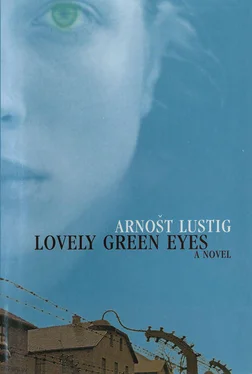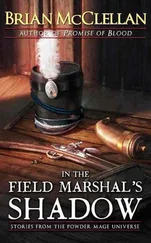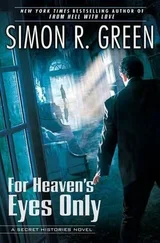Madam Kulikowa had to chase the girls away from the window. Bumping over the frozen snow, one wing almost dragging on the ground, was a Heinkel. It came to a halt by the gate, its fuselage full of holes. The guards ran up to it and released the pilot from his harness. His temples were crushed, he was bruised and blood was oozing from a shoulder wound. His knees gave way and he sank down and crouched on the ground, letting out his breath as if it were his last. The weak sun was reflected from the gilt tin eagle over the entrance and cast flickering patches on the pilot. He looked like a caricature of an airman from the film Quax, the Pilot without Fear or Blemish that the Madam had seen. The guards picked him up carefully.
“Where am I? Mein Gott…”
“Feldbordell No. 232, Herr Hauptmann,” a guard with a scar stretching from one ear to the other reported smartly.
Oberführer S chimmelpfennig came running out to the sentry box by the gate. He introduced himself, giving his rank and title.
“Into my surgery,” he commanded.
The airman’s blood had stained his flying helmet. He was on the brink of fainting. In his half-closed eyes there was guilt, lethargy and exhaustion. He was shivering now, all but unconscious. Life was draining from him.
“You’ll be all right,” the Oberführer assured him. His voice was serious but not compassionate. His eyes swept over the aircraft. Pride not pity. We were born to perish , the Oberführer thought.
The guards carried the dead airman away. His blood was on their gloves and on their white snowsuits.
The truck from the Wehrkreis that arrived to remove the plane delivered some cases with winter wear. It included three pairs of felt boots with thick soles.
That evening, in her room with the vaulted ceiling, the Madam was massaging Major von Kalckreuth’s back. A sebaceous cyst had formed on his right side. He hoped it was nothing worse. The Madam told him that she had dreamed, of all things, of Auschwitz-Birkenau. Each time she mentioned the camp she emphasized that she had been in the Aryan section.
The massage made him feel good.
“Know what I heard?” he asked. “That a baby in his mother’s womb will turn into the correct position, head down, if they prick her thumb with a needle and at the same time light a candle with a special Chinese herb.”
The major was interested in alternative medicine. The Oberführer did not hold with it.
“The Chinese practise acupuncture on most parts of the body, something our doctors don’t even dream of.”
He heaved a sigh. He recalled what he knew about the Japanese attack on Nanking, when the soldiers had practised bayonet drill on their Chinese prisoners of war and the civilian population. He had also read in a brochure that the Chinese police in Shanghai were the first, as early as 1920, to equip their men with pistols with six-round magazines. History was racing ahead, that was a fact.
“All our watches are showing five minutes to midnight,” he said. “How come you don’t have a portrait of Adolf Hitler in here?”
He heaved another sigh.
“Some people still confuse freedom with impertinence.”
Twelve: Horst Hoffe, Jünger Strasser, Hermann Bock, Franz Klang, Hans Rössel, Manfred Kaas, Ernst Tippelkirsch, Gregor Schleichner, Uwe Hugehberg, Boris Fricke, Hans Besitz, Harry Höppner.
Estelle had narrowly escaped a flogging.
“I’m marking off the days,” she said. “So far I’ve got away with it. I’m being careful.”
Something familiar made them compare their fates. Skinny examined every remark, every hint of Estelle’s. In Germany and the occupied territories there were masses of such girls, driven into brothels by the authorities. And thousands who had volunteered.
They were waiting in the corridor for a tub to become vacant. On the thick wooden floor slats, which could be lifted and stacked up, Estelle looked slight, almost frail, with long black hair whose ends she singed and mother-of-pearl earrings in delicate lobes. She burped, but she didn’t have sour breath.
“I’m waiting all the time,” she said, undoing her buttons. Had she crossed the boundary beyond which girls were no longer forgiven?
“I get cramps — herpes. I’m terrified I might get a rash. When I bleed I’m afraid I might be dying. I feel like when you crack a hazelnut, or when someone steps on your belly.”
They stood facing each other. White steam came from their mouths.
“You’re warming me,” said Estelle.
“The Oberführer went to Festung Breslau this morning.”
“To recruit girls?”
“I don’t know.”
“The first three hours are the worst for me.”
It was with them all the time, even if they appeared hardened: Virginity, the first experience, the worst and the better ones, anything that was the first time and began to repeat itself, like menstruation.
Estelle was naked now, and climbed into the tub. Skinny joined her. “Yes,” Skinny said.
Madam Kulikowa taught Skinny to sing “The Cocotte”. There would be an evening entertainment. Did she know “Deeper than the Sea, Hotter than the Sahara”? They might rehearse a cabaret number about Lucifer meeting Beelzebub.
When the full moon wasn’t hidden by clouds and as long as the stars were shining, the wolves seemed white, with huge silver eyes. They emerged from the darkness, phantoms of the night, enfolded in a kind of unknowing. They moved about the snow-covered wasteland wrapped in a cloak of darkness, illuminated by the moon. They made her aware of what humans lacked: fierceness, the dark rays of night. She admired them and she was afraid of them. Now and then the guards caught them in their searchlights. It was a different light from the one the wolves were born into. Day and night made no difference to them. They came from lairs in the quarry and among the rocks. They did not recognize frontiers, any more than the Germans did.
Crows were flying across the same night sky. They could not be seen, like the rats and the wolves, only heard. Croaking, howling and whistling pierced the night. Like unintelligible messages, vague prophecies. Something more ancient than man.
In the morning the guards exercised in the snow without shirts, just in trousers. The S S maintenance staff were extending the gym by breaking down the wall between what had been the cowshed and the stables. The buildings were made mainly of stone, partly from wood. Commandant Trillhase had had the yard paved wall to wall. When the girls had swept the snow away, the stones shone like ancient hieroglyphs. Oberführer Brandenburg-Luttich said once that the stones looked as if they had been inscribed by the Jews who had worked in the quarry. The inscriptions seemed to him like Hebrew letters, or like ancient Germanic runes.
The Oberführer thought that No. 232 Ost was an ideal spot linking them to the front, the hinterland and the Wehrkreis, as if made for defence and attack. He agreed with Oberführer Schimmelpfennig, The Frog, that the substance of which the German soul was made was hardness not compassion. Those who would read the stones would read German.
Twelve: Kurt Wegener, Gerd Wolf, Alexander Penske, Albert Heller-Kaiser, Max Gunther Friedenthal, Martin Schwitzer, Hans-Peter Krume, Kleo Hahn, Fritz Mani, Hans Lage-Hegern, Helmut Binder, Hans Anglia Jürgensohn.
When they had let the water out of their tubs they were to report to Oberführer S chimmelpfennig’s surgery to get an injection against Ebola or Marburg disease, something spread by rats and bats and their excrement. Their temperature would go up temporarily. No cause for alarm. As a special concession reveille the following day would not be until 5.30 a.m.
Big Leopolda Kulikowa got the Pole who came over to tattoo the girls to pull out a painful back tooth for her. She didn’t want to ask the Oberführer, but she needed a painkiller from him. She hated asking for anything. Out in the corridor she spat out some blood.
Читать дальше


![Корнелл Вулрич - Eyes That Watch You [= The Case of the Talking Eyes]](/books/32103/kornell-vulrich-eyes-that-watch-you-the-case-of-thumb.webp)









